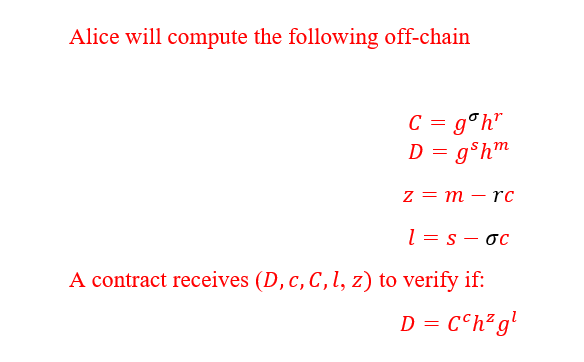I have Alice who should do some cryptographic operations off-chain. Then a smart contact has to verify equality by performing Modular exponentiation operation. I attached an image of the off-chain and on-chain operations. Is there any library that can verify the last equality in the image. I tried to write the math here, but writing math equations is not allowed.
2 Answers
Modular exponentiation can be computed on Ethereum using a precompile, which is included in all client implementations since the Byzantium fork (cf EIP-198) at address 0x05. Precompiles can be called from a Solidity smart-contract using assembly code.
I couldn't find a proper smart-contract calling the modular exponentiation precompile but as an example, calling the ecmul (at address 0x07) can be done using the following code:
function ecmul(uint256 x, uint256 y, uint256 scalar) public constant returns(uint256[2] p) {
// With a public key (x, y), this computes p = scalar * (x, y).
uint256[3] memory input;
input[0] = bx;
input[1] = by;
input[2] = scalar;
assembly {
// call ecmul precompile
if iszero(call(not(0), 0x07, 0, input, 0x60, p, 0x40)) {
revert(0, 0)
}
}
}
From the answer of @Julien Marchand it's possible to create the function viewing the attributes of the precompiled contract:
https://github.com/ethereum/go-ethereum/blob/master/core/vm/contracts.go#L226
Address: 0x05 https://github.com/ethereum/go-ethereum/blob/master/core/vm/contracts.go#L56
The verify function is untested but maybe could help.
pragma solidity ^0.5.8;
contract ModularCheck {
// Untested code
function verify(uint256 _D, uint256 _C, uint256 _c, uint256 _h, uint256 _z, uint256 _g, uint256 _l, uint256 _modulus) public returns (bool){
uint256 exp1 = modExp(_C, _c, _modulus);
uint256 exp2 = modExp(_h, _z, _modulus);
uint256 exp3 = modExp(_g, _l, _modulus);
if(_D == mulmod(mulmod(exp1,exp2, _modulus),exp3, _modulus)) return true;
}
function modExp(uint256 _b, uint256 _e, uint256 _m) public returns (uint256 result) {
assembly {
// Free memory pointer
let pointer := mload(0x40)
// Define length of base, exponent and modulus. 0x20 == 32 bytes
mstore(pointer, 0x20)
mstore(add(pointer, 0x20), 0x20)
mstore(add(pointer, 0x40), 0x20)
// Define variables base, exponent and modulus
mstore(add(pointer, 0x60), _b)
mstore(add(pointer, 0x80), _e)
mstore(add(pointer, 0xa0), _m)
// Store the result
let value := mload(0xc0)
// Call the precompiled contract 0x05 = bigModExp
if iszero(call(not(0), 0x05, 0, pointer, 0xc0, value, 0x20)) {
revert(0, 0)
}
result := mload(value)
}
}
}
-
@albeerto, can I test this code on remix. or should I have account on etherum blockchain to call the contract at 0x05 Commented Jun 7, 2019 at 20:41
-
-
But remix has the precompiled contract 0x05 ? in other words, on the current time, I do not have access to the real etherum blockchain so can I test it locally on remix Commented Jun 7, 2019 at 21:46
-
Yes, it has, you only need to copy the code and paste on remix. If you prefer, copy only the function modExp() to your contract.– albertoCommented Jun 7, 2019 at 22:02
-
Could you please suggest how can I create values to test your answer. In other words, How to generate values for D,C,c,l,z to test your contract. Commented Jun 10, 2019 at 5:56

